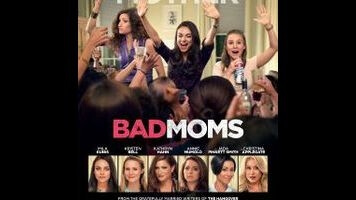Bad Moms alternates satire with easy answers

Hollywood franchise-building is a competitive business, so it’s remarkable to see how many different studios have agreed to put aside their differences and allow the Bad series to develop across various corporate borders. Sure, there may not any formal connection between Bad Santa, Bad Teacher, Bad Grandpa, Bad Words, Bad Gymnast (sorry, The Bronze), and the new Bad Moms apart from the universal desire to attract audiences with the promise of zanily inappropriate behavior from people who are supposed to be role models and/or authority figures. But they do seem to be the product of an agreement that everyone is allowed to rip off this concept from everyone else. All of these studios and filmmakers may revel in bad behavior, but they seem to know how to share.
Shared ideas aside, there is something more transgressive, however faintly, about the impulses behind Bad Moms. When Amy (Mila Kunis) opens the movie with an immediate barrage of exposition-dump narration about the two kids she had young and the challenges she faces as a working mother, the clunkiness feels believable, in its way: She doesn’t have time to engage in graceful visual storytelling, especially not with the soft-focus, washed-out cinematography. Pushed to the breaking point after a particularly bad day (and faced with a particularly unhelpful, possibly disloyal husband), Amy wanders into a bar, where she befriends Kiki (Kristen Bell), the similarly beleaguered stay-at-home mother of four, and single mom Carla (Kathryn Hahn). They resolve to rebel against the perfect-mom fascism of PTA president Gwendolyn (Christina Applegate, flanked by minions played by Jada Pinkett Smith and Annie Mumolo).
Bad Moms has some fun blowing up the ridiculous expectations placed on the modern supermom, as when Gwendolyn unveils her enthusiastically insane plans for a Bake Sale Police to monitor and “prosecute” the use of unapproved ingredients, such as butter, sugar, or eggs. Amy also has to contend with her tween daughter’s stress over getting on the soccer team (and, eventually, into an Ivy League college), her son’s homework laziness, and the unending demands of her part-time job in a mostly millennial workforce. Many of these are first-world problems to be sure, especially when the movie gives all of its characters plenty of money and means to get by, but at least they’re first-world problems rooted in the psychological reality that many parents, especially mothers, feel enormous pressure to make their kids’ lives conform to ever-shifting standards of perfection.
The process of making a relatable comedy while simultaneously engaging in another Bad-off puts some strain on writer-directors Jon Lucas and Scott Moore (who are also beneficiaries of the unfortunate fact that even if a movie has half a dozen major female characters outnumbering the men, it’ll probably still be dudes running things behind the camera). Especially early on, the movie alternates innocuously lame sight gags like a dog wearing a bike helmet with jokes about anal sex and webcam masturbation. Bad Moms reconciles these two impulses by assuming its audience will be delighted and scandalized by any use of the word “fuck” or “vagina,” and proceeds to let them fly.
The performers do sell a lot of this material. Bell is especially funny as a cheery, lonely mom whose litany of childcare responsibilities has cut her off from the rest of the world. Kunis, who has been funnier elsewhere, is too often tasked with offering a generic “I suck at this” sentiment and laughing at the others’ craziness; it’s really Hahn who fills the Billy Bob Thornton/Cameron Diaz role of sleeping around, speaking bluntly, and not giving a fuck. Hahn is always enjoyable to watch, and sometimes the movie obliges her talent with good, weird jokes, like when she and Bell rattle off the ultra-specific mom sub-demographics Amy will have to court if she runs for PTA president against Gwendolyn.
In these moments, Bad Moms becomes a sweetly bonkers satire. But it sells its characters’ struggle short by shuffling their kids off screen whenever it’s convenient, and not even in the name of comical neglect; there always seems to be time and money to get a sitter. This is a necessary mechanism to get the three central characters hanging out together without interference, but at times turns the movie into a referendum on unhelpful husbands of well-off moms, rather than the absurdities of Perfect Mom culture. Amusing as it is, the movie never resolves its tension between real truths and movie-land problem-solving where the good guys win out because they’re good—no matter how “bad” they pretend to be.